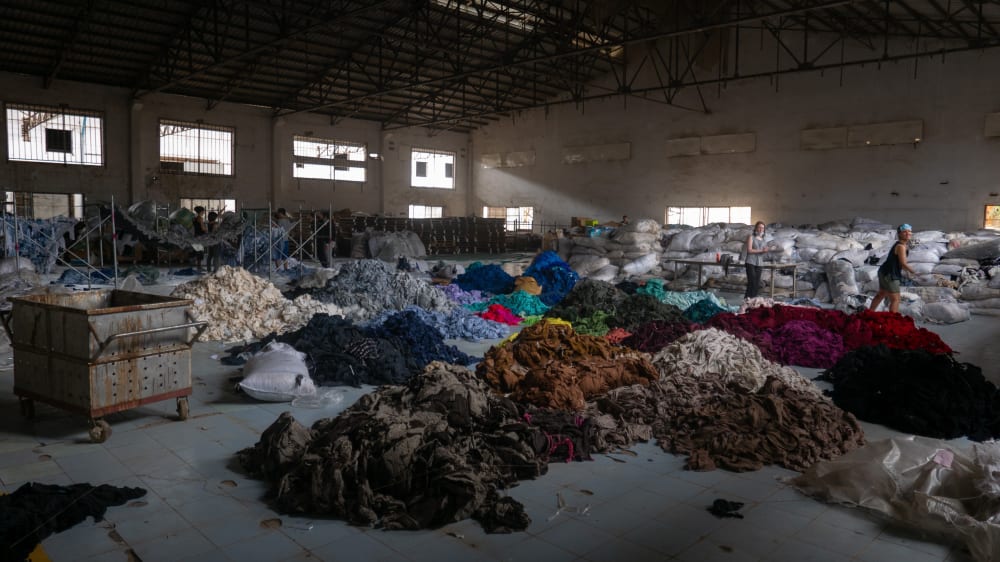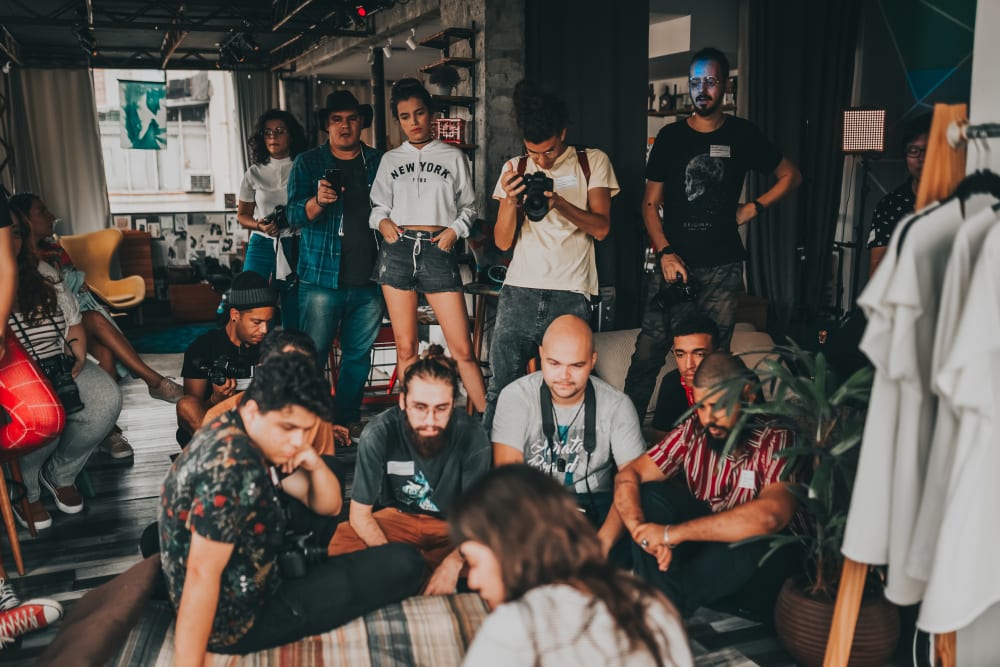Ethical fashion often refers to the protection of workers rights and enabling the voices of those who make our clothes. The ongoing debate around ethics in fashion stems from a general lack of robust and suitable governance and legislation, to deal with the complexity of fashion supply chains. Many across the industry argue for stronger legally binding and sanction-based rules, in lieu of what is currently in place.
For instance, in the UK, the Modern Slavery Act passed in 2015, requires organisations (with an annual turnover of more than £36 million), to publish an annual statement, outlining the actions they are taking to combat modern slavery within their supply chains, or to declare if no steps have been adopted. As of today, the Act does not stipulate that companies must take action to eradicate any issues highlighted.
The Act is a microcosm of how the fashion industry is currently permitted to operate.
Unveiling global fashion supply chains
The fashion industry’s supply chains are notoriously extensive and inflexible. As the world was plunged into lockdowns during the pandemic, we caught a glimpse of companies’ reliance on global supply chains.
Within the fashion industry, countless brands in the west cancelled existing contracts with manufacturers, whilst refusing to pay for goods ordered, leaving foreign manufacturers facing ruin. ‘The Business of Fashion’ reported that by March 2020, “Western fashion brands had reportedly cancelled $2.8 billion of orders from Bangladeshi suppliers, impacting the livelihoods of 1.2 million workers”, highlighting the proliferation of power imbalances in globalised supply chains.

Subcontracting is also a widely employed aspect of fashion supply chain management. With pressure exerted by brands to complete orders, suppliers often subcontract part of the manufacturing to other factories, moving production into facilities outside the scope of the brands oversight and regulations. During the aftermath of the 2013 Rana Plaza tragedy, which took the lives of 1,134 garment workers, it became clear that some brands had no understanding of who was producing their garments. The eight-story Bangladeshi building collapsed due to structural failures and remains the deadliest garment factory disaster in history. The 5 factories inside Rana Plaza supplied to major international labels, and the disaster became the first event to shine a spotlight on the fashion industry’s supply chains, most predominantly their manufacturing procedures. Brands often neither disclose nor monitor their 2nd tier suppliers, increasing the risk of human and labour rights infringements.
A Western Perspective on Ethics
The fashion industry regularly outsources to a vast number of suppliers, often in developing countries, categorised by the prevalence of low-cost labourers and low tax. However, as evidenced by the Leicester garment factory scandal in the UK, the issue of supply chain outsourcing is not only restricted to such countries.
During the height of the 2020 UK lockdown, it was uncovered that workers of a fast fashion retailer in the UK, were manufacturing in unsafe COVID environments, on wages averaging around £2-£3 an hour. The ‘Labour Behind the Label’s’ report into Leicester’s garment factories during the pandemic, states that workers were threatened with job loss if failing to appear at work, even if they showed COVID symptoms. These revelations shocked the nation, as many were confronted with what they viewed as ‘global south’ issues.
The Leicester scandal is not a solitary case, but part of a larger widespread problem that is exacerbated by the lack of comprehensive regulation.
There is also a significant portion of fashion workers in the UK creative industry, comprising freelancers and those who are self-employed. Critical roles such as freelance illustrators, photographers, stylists, and interns are heavily relied upon in the fashion industry. During the pandemic, freelancers were ineligible for sick pay, and the STUC (Scottish Trade Union Congress) reported that “Workers in creative industries are more than twice as likely to be working two jobs than the workforce in general”. Millions of contracts were broken, with no governmental support, other than universal credit.

Creating more inclusiveness in fashion
The incongruence of how brands dominate the dialogue of ethics, whilst continually ignoring the voices of the people affected most by brands decisions, is a common occurrence. Nazma Akter (Founder of Awaj Foundation and Trade Unionist) shared her experience at the 2019 Copenhagen Fashion Summit. According to her account, she was the only garment worker delegate in attendance at the event. Among a sea of CEO’s, fashion powerhouses, and magazines, panels of initiatives and targets were extolled, without any mention of workers or their rights.
After the Rana Plaza incident, the Accord on Fire and Building Safety was signed in Bangladesh. This was achieved following huge public outcry, after which, many international brands rushed to sign the Accord that requires building inspections to check fire, electrical, and structural security. However, there is a concern that initiatives often focus on occupational safety rather than worker’s rights and wellbeing.
A recent report led by the Modern Slavery PEC (Policy and Evidence Centre), stated that “Around a fifth of auditors had not checked for one or more issues relating to women workers rights”. Auditing is often questioned for its effectiveness to detect and ensure compliance obligations. The 2012 Pakistan factory fires that killed over 200 people, occurred 1 month after receiving a SA8000 (certificate of internationally recognized standards of decent work) by a 3rd party audit.
Standard audits usually involve a factory site tour, reviewing documentation and interviewing workers. If brands impose unachievable standards on suppliers, factory conditions can be misrepresented, whilst encouraging a ‘tick box’ process for suppliers to ‘pass the audit’. Factories become overwhelmed, resulting in mock compliance, hiding information, coaching workers for interviews, and keeping separate records for auditors.
Towards more ethical fashion
Ensuring ‘inclusivity’ across the complete supply chain can help improve the ethics of fashion, with all voices included in the dialogue. Some smaller businesses characteristically have shorter supply chains, enhancing the ability to nurture direct relationships with suppliers, manufacturers, and workers. These personal relationships allow the connections to thrive, ensuring common values and ‘good practice’ are upheld throughout the complete supply chain.
Collaboration, with local trade unions, NGO’s, suppliers, buyers, and workers to collectively agree policy, is an alternative approach to the ‘top-down’ structure that usually operates in larger organisations. Overcoming power asymmetries between the diverse levels of the supply chain can also help remediate issues being pushed underground.
As we await legislative evolution and stronger governance, we as consumers can still drive change in the industry. Many fashion businesses are leading the ‘race-to-the-bottom’, trying to achieve the lowest price, quickest lead-time, eliminating product development and quality control, whilst exploiting their workforce to bring down costs. As consumers, we can choose to purchase from businesses who work more inclusively and collaboratively, in taking a more ethical approach to fashion. For example, we can avoid businesses that follow destructive trend cycles; purchase from those that produce in smaller batches or quantities; prioritise quality when we buy and set realistic expectations of how long it should take for items to be made and delivered. Not only can we support those businesses with our custom, but our individual choices can also influence others to reassess their ethical practices.
Like what you just read? Share it on:

